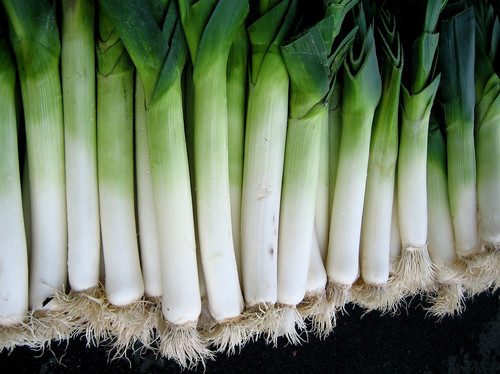Short answer
Leeks are loaded with nutrition, high in antioxidants and have natural anti-microbial and anti-inflammatory properties. Leeks are a great source of vitamins and minerals and are a great addition to healthy recipes. Leeks are very high in vitamin K which could pose a drug interaction in individuals on blood thinning medications.
Recommended Alternative
Long answer
Leeks are vegetables closely related to onions, scallions, shallots and the garlic family. Leeks have a mild taste and will add tremendous nutritional value to any recipe. Leeks are potent antioxidants that contain allicin-a natural anti-inflammatory sulfur compound that can fight off dangerous free radicals. Toxic free radicals are cellular scavengers that can damage cellular DNA, promote inflammation, lead to degenerative disease, cardiopulmonary disease and even cancer. Antioxidants are an important part of a healthy lifestyle. Allicin is also a potent anti-microbial-demonstrating anti-bacterial, anti-viral and anti-fungal properties. Allicin can aid in reducing cholesterol levels by blocking harmful enzyme pathways in the liver.
Another great benefit of eating leeks is that they contain a flavonol called kaempferol. This adds to the antioxidant power of the leek and is showing promise in the prevention of cancers. A multitude of research studies have shown the benefits of kaempferol in cancer states. A 2016 study in particular demonstrated kaempferols ability to block pancreatic cancer cell growth and migration through certain in vitro pathways. The results were especially impressive because of the aggressive nature of pancreatic cancer.
Kaempferol is a natural anti-inflammatory that can prevent heart disease. In a 2005 study by Jan Kowalski et al (Pharmacological Reports) kaempferol blocked a protein called MCP-1. This protein plays a pivotal role in the initial formation of atherosclerotic plaque. By blocking MCP-1 this should lower the risk of plaque formation and cardiovascular events. Leeks are felt to increase nitric oxide production in the blood stream allowing for relaxation of the blood vessels which would increase blood flow and oxygen delivery to vital organs and tissues.
Leeks are low in carbohydrate, low in calorie, provide fiber and have no fat or cholesterol. They are a great choice for diabetic individuals and for people looking to lose weight. The fiber helps with bowel regularity and supports healthy glucose levels. Leeks are a great source of vitamin A and K, and contain healthy amounts of manganese, vitamin C, iron, folic acid, copper, niacin, riboflavin, magnesium and thiamin. Leeks support healthy eyesight, help with red blood cell production and healthy bone formation. Leeks are immune boosters. Eating leeks during pregnancy may help to prevent neural tube defects. Leeks contain Omega-3 fatty acids which are important for healthy neurologic function and a healthy cardiovascular system. Leeks are low in sodium which can reduce blood pressure in individuals dealing with hypertension.
Overall, leeks are a powerhouse of nutrients and adding them to your diet is going to enhance your quality of life. The only potential side effect comes from the high content of vitamin K. Individuals on blood thinners need to check with their health care professional before adding leeks to their diet.
Possible short-term side effects
- could interfere with blood thinning medicaitons
Ingredients to be aware of
- high amount of vitamin k

Benefits
- great source of vitamins and minerals
- no fat, low calories and no cholesterol
- great for weight loss and for diabetics
- heart healthy and supports healthy blood pressure
- low in sodium
- powerful antioxidant
- natural anti-inflammatory
- cancer fighting properties
- natural anti-microbial
- immune benefits
 Approved by
Approved by 















